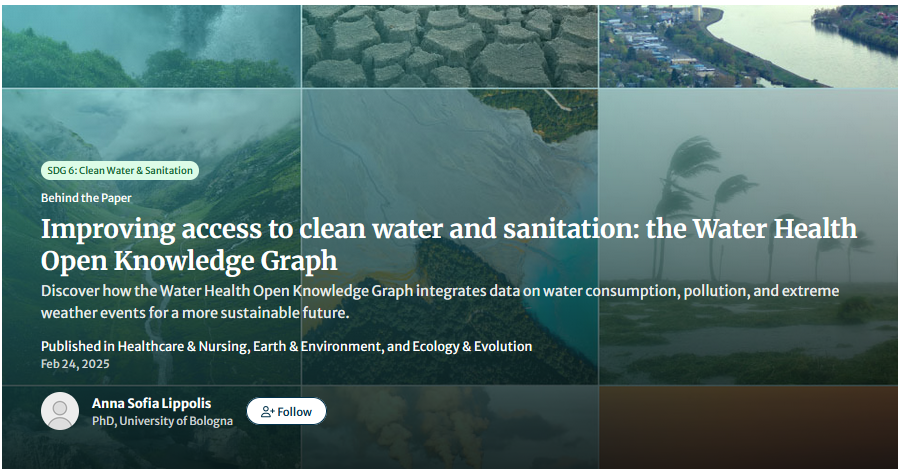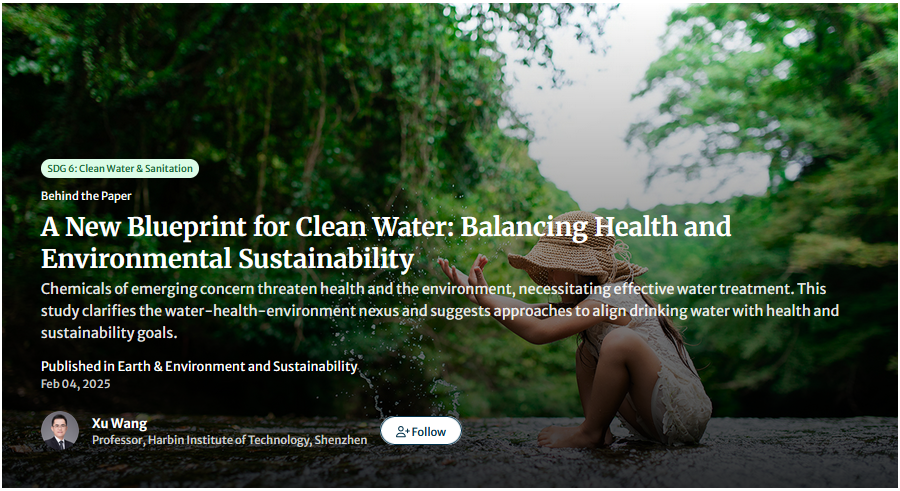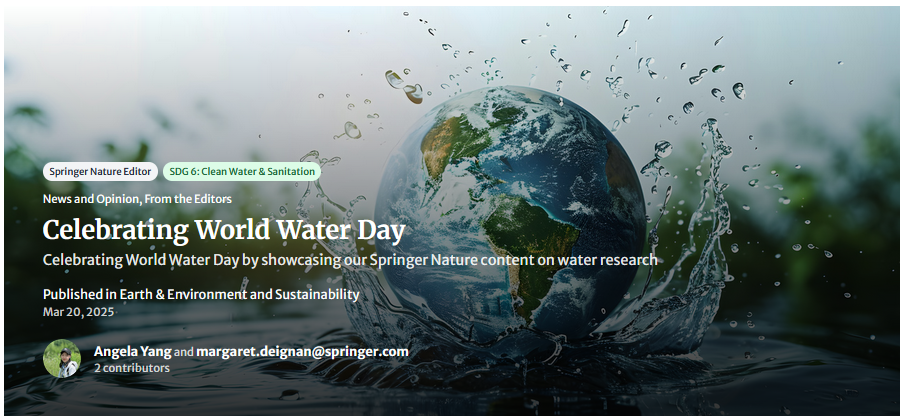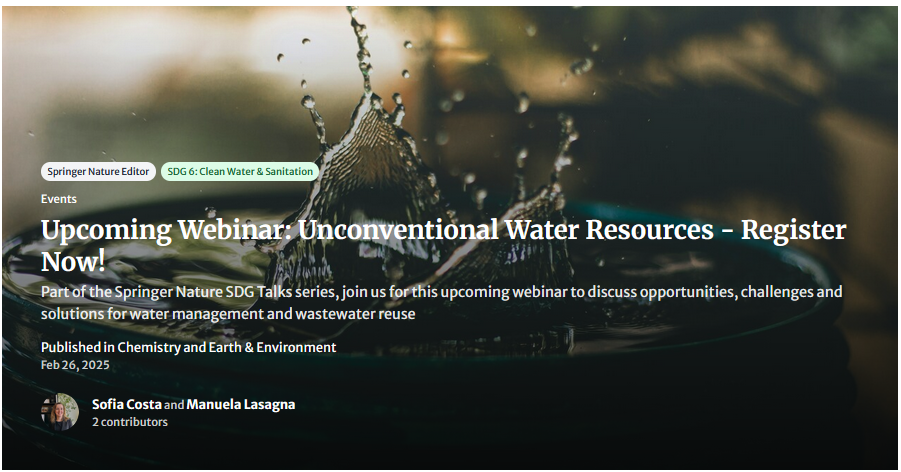💧Exploring World Water Day: Key Findings, Events and Insights
Published in Earth & Environment and Ecology & Evolution

As World Water Day approaches on March 22nd, it's a crucial time to reflect on the urgent need for sustainable water management. This year’s theme, ‘Glacier Preservation’, underscores a growing crisis—glaciers are melting at an alarming rate, threatening ecosystems, water supplies, and communities worldwide. Preserving these vital ice reserves isn’t just about environmental conservation, it’s a survival strategy for the future.
 Photo: UN-Water
Photo: UN-Water
If you’d like to dive deeper into these important topics, why not explore the following Behind the Paper posts, which shed light on the critical work being done to address water challenges:

Empowering Water Health Discussion: The Water Health Open Knowledge Graph
The Water Health Open Knowledge Graph (WHOW-KG), developed by @Anna Sofia Lippolis and recently published in Scientific Data, integrates data from the Italian National Institute of Environmental Research (ISPRA) and the Lombardy Region to improve access to critical information on water consumption, quality, and health impacts. Developed under the Connecting Europe Facility program, this project aims to break down data silos, enabling policymakers and researchers to make informed decisions on water-related challenges. With applications in monitoring marine contaminants, ensuring safe drinking water, and assessing the impacts of extreme weather, WHOW-KG seeks to provide a collaborative, open platform that supports evidence-based decision-making for improved water policy, public health, and climate resilience. To explore how the Water Health Open Knowledge Graph is helping to transform water policy and health outcomes, read the full post here.
Rethinking Clean Water: A Smarter Approach to Health and Sustainability
In a world where chemical pollution threatens both human health and ecosystems, @Xu Wang shares a blog about the work to develop a transformative approach to water purification, which was recently published in in Nature Communications. Their study evaluated riverbank filtration with advanced reverse osmosis (RBF-RO) and introduced the WEALTH framework—a holistic model balancing water quality, environmental sustainability, and public health. By working to eliminate cancer risks linked to chemicals of emerging concerns (CECs) while addressing energy and ecological trade-offs, their research seeks to offer a scalable blueprint for cleaner, safer water worldwide. Explore more about how they think this approach could redefine the future of sustainable water treatment.
Explore books, journal collections, and open-access articles on clean water and sanitation
@Angela Yang and @margaret.deignan@springer.com from Springer Nature highlight key research on water sustainability, from innovative water reuse strategies to emerging pollutants and groundwater management. Read their latest blog to explore books, journal collections, and open-access articles that contribute to advancing water security, protecting resources, and addressing the global sanitation crisis.
Sustainable Development Goals (SDGs) & SDG 6: Clean Water and Sanitation
The United Nations Sustainable Development Goals (SDGs) are a global call to action adopted by all UN member states to promote prosperity while protecting the planet. These 17 interconnected goals address key global challenges, including poverty, education, health, economic growth, and environmental sustainability. In recognition of these efforts, the 2025 UN Sustainable Development Goals (SDGs) Action and Awareness Week was celebrated from March 3-7, reinforcing the importance of collective action in achieving these global objectives. If you'd like to learn more about the SDGs, dive into this SDG introduction from @Yuanxin Zhang .
Goal 6: Clean Water and Sanitation focuses on ensuring the availability and sustainable management of water and sanitation for all. Access to clean water and proper sanitation is fundamental to human health, environmental sustainability, and overall development. This goal addresses not only drinking water, sanitation, and hygiene (WASH) but also the long-term quality and sustainability of global water resources. Clean water is essential for progress in nutrition, education, health, and gender equality, making SDG 6 a crucial pillar of sustainable development.
Upcoming Events on Water Sustainability
Upcoming Webinar: Unconventional Water Resources - 25th of March 2025 at 2:30 pm CET / 1:30 pm GMT / 8:30 am EST
SDG6 states that achieving "clean water and sanitation for all" is essential for the development of human society.
In this SDG Talk, Prof. Marco Minella, Prof. Manuela Lasagna, Dr.Prof Alessandra Bianco Prevot and Engineer Pedro Simón will offer an overview of Earth’s water resources and explore unconventional ones. From understanding how water resources are overexploited in combination with the impact of climate change, to the importance of water resources for human health and ecology, and how wastewater reuse could help to address growing concerns. Find out more and register here.
Event Roundups on Water Sustainability

Nature Water Talks: Water Observing and Monitoring
Missed the January Nature Water Talks? Catch up with the recording and here from experts in the Nature Water Talks, exploring the latest technologies in water observation and monitoring. Including the importance of understanding water cycles, quality, and distribution to ensure sustainable practices.
For the latest updates on upcoming Nature Water Talk events and discussions on water sustainability, follow @Fabio Pulizzi, Chief Editor of Nature Water.
Join the Conversation!
We’ve enjoyed exploring the wealth of knowledge shared in these posts and events that aim to inform sustainable water management practices and would love you to engage in the conversation. Whether it’s through reading and commenting on these insightful studies or participating in upcoming events, your voice matters in tackling the global water challenge – add a comment to start the conversation.
For more stories behind the latest research headlines, head over to the Behind the Paper channel or check out:
Let’s work together to build a sustainable future. Happy reading, and Happy World Water Day! 🌍💧
Follow the Topic
-
Nature Communications

An open access, multidisciplinary journal dedicated to publishing high-quality research in all areas of the biological, health, physical, chemical and Earth sciences.
-
Scientific Data

A peer-reviewed, open-access journal for descriptions of datasets, and research that advances the sharing and reuse of scientific data.
-
Discover Water

This journal is part of the Discover journal series. It is an open access, community-focussed journal publishing research from across all fields relevant to water research.
-
Nature Water

This journal publishes research on the evolving relationship between society and water resources on a monthly basis. It covers the natural sciences, engineering, and social sciences, with a particular interest in regards to interdisciplinary research.
-
Discover Applied Sciences

This is a multi-disciplinary, peer-reviewed journal for the disciplines of Applied Life Sciences, Chemistry, Earth and Environmental Sciences, Engineering, Materials Science and Physics, fostering sound scientific discovery to solve practical problems.
Related Collections
With Collections, you can get published faster and increase your visibility.
Eco-Friendly Water Pollution Control: Nano-Catalysis, Advanced Oxidation & Membrane Technologies for Sustainability
We invite original research and review papers on innovative eco-friendly approaches for water pollution control, focusing on advancing sustainable development. Topics of interest include, but are not limited to, nano-catalysis, advanced oxidation processes (AOPs), and membrane technologies. These solutions offer potential for effective removal of contaminants, energy efficiency, and minimal environmental impact. Papers should explore the development, optimization, and application of these technologies in reducing pollutants, enhancing water quality, and supporting global sustainability efforts in water management.
Keywords: Advanced Oxidation Processes (AOPs); Wastewater Treatment; Water Pollution Control; Sustainable Development; Nano-catalysis; Membrane Technologies; Fenton Reactions; Environmental Remediation; Carbonaceous Materials; Contaminant Degradation; Water Resource Management; Eco-friendly Technologies; Green Chemistry.
This Collection supports and amplifies research related to SDG 6: Clean Water and Sanitation, SDG 9: Industry, Innovation, and Infrastructure, SDG 11: Sustainable Cities and Communities, SDG 12: Responsible Consumption and Production, SDG 13: Climate Action, SDG 14: Life Below Water.
Publishing Model: Open Access
Deadline: Apr 01, 2026
Engineering: Computer Aided Engineering Design, Manufacturing and Maintenance
Publishing Model: Open Access
Deadline: Jun 30, 2026








Please sign in or register for FREE
If you are a registered user on Research Communities by Springer Nature, please sign in